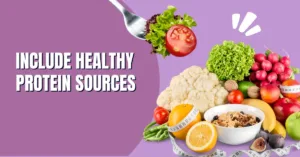
7 Simple, Sustainable Nutrition Tips for Long-Term Health
- 140
- 0
- 0
Sustainable nutrition tips for long-term health are important because they promote a balanced diet that supports both personal well-being and environmental health. By focusing on whole, minimally processed foods, individuals can improve their overall health, reduce the risk of chronic diseases, and maintain a healthy weight. Additionally, sustainable nutrition encourages the consumption of local and seasonal foods, which benefits local economies and reduces carbon footprints. This approach fosters a healthier lifestyle while protecting the planet for future generations, making it a win-win for both individuals and the environment.
Simple, sustainable nutrition tips for long-term health
Eating well doesn’t have to be complicated or overwhelming. In fact, making small, consistent changes to your diet can lead to big improvements in your health over time. We’ve put together 7 easy-to-follow simple, sustainable nutrition tips for long-term health. These tips are based on solid scientific evidence and are designed to be sustainable for the long run.
Eat more colorful fruits and vegetables

One of the best things you can do for your health is to eat more fruits and vegetables. They’re packed with vitamins, minerals, fiber, and other nutrients that help keep your body working well. Plus, they’re naturally low in calories, so they can help you maintain a healthy weight.
Try to fill half your dish with fruits and some green vegetables at each meal. Aim for a variety of colors – each color offers different health benefits:
- Red (tomatoes, strawberries, red peppers): Good for heart health and may lower cancer risk
- Orange and yellow (carrots, oranges, squash): Support eye health and immune function
- Green (spinach, broccoli, kiwi): May lower cancer risk and support bone health
- Blue and purple (blueberries, eggplant, grapes): Good for brain health and may lower heart disease risk
- White (cauliflower, garlic, onions): May lower cholesterol and blood pressure
If you’re not used to eating lots of fruits and vegetables, start small. Add an extra serving to one meal each day, then gradually increase. You might try adding berries to your breakfast, having a side salad with lunch, or including an extra vegetable with dinner.
Don’t worry too much about whether fresh, frozen, or canned is best. While fresh can be great, frozen fruits and vegetables are usually just as nutritious and often more affordable. If using canned, look for options without added sugar or salt.
Choose whole grains over refined grains

Whole grains are much healthier than refined grains. They contain all parts of the grain – the fiber-rich outer layer, the nutrient-packed germ, and the starchy endosperm. Refined grains have had the outer layer and germ removed, leaving mostly just the starchy part.
Eating more whole grains can help lower your risk of heart disease, type 2 diabetes, and some cancers. They’re also great for digestive health and can help you feel full and satisfied.
Some manageable ways to consume more whole grains:
- Change from white bread to whole wheat bread
- Try brown rice or quinoa instead of white rice
- Choose whole grain pasta over regular pasta
- Have oatmeal for breakfast instead of sugary cereals
- Snack on plain popcorn instead of chips
When shopping, look for “whole grain” or “whole wheat” as the first ingredient on food labels. Don’t be fooled by terms like “multi-grain” or “wheat flour” – these don’t necessarily mean whole grain.
Include healthy protein sources

Protein is important for building and repairing tissues, making enzymes and hormones, and supporting a healthy immune system. It also helps you feel full and satisfied after eating.
Good protein sources include:
- Lean meats (chicken, turkey, lean beef)
- Fish and seafood
- Eggs
- Beans and lentils
- Nuts and seeds
- Tofu and other soy products
- Low-fat dairy products
Try to include a source of protein with each meal. If you eat meat, choose lean cuts and aim for at least two servings of fish per week. Fish, especially fatty fish like salmon, is high in heart-healthy omega-3 fatty acids.
Plant-based protein sources like beans, lentils, and nuts are great too. They’re high in fiber and other nutrients, and can be very affordable. Even if you’re not vegetarian, try having a few meatless meals each week using these protein sources.
Limit added sugars

Too much added sugar in your diet can lead to weight gain, tooth decay, and increased risk of type 2 diabetes and heart disease. The problem is, added sugars are hiding in many foods we might not expect.
Some common sources of added sugars:
- Soft drinks and sweetened beverages
- Baked goods (cookies, cakes, pastries)
- Candy and chocolate
- Sweetened yogurts
- Breakfast cereals
- Condiments like ketchup and barbecue sauce
To cut down on added sugars:
- Drink water, unsweetened tea, or coffee instead of sugary drinks
- Choose plain yogurt and add your own fresh fruit for sweetness
- Read food labels and choose products with less added sugar
- Satisfy your sweet tooth with whole fruits instead of candy or baked goods
- When baking at home, try using less sugar than the recipe calls for
Remember, we’re talking about added sugars here, not the natural sugars found in whole fruits, vegetables, and plain dairy products. These foods are healthy and don’t need to be limited.
Choose healthy fats

Not all fats are bad for you. In fact, some types of fat are essential for good health. The key is choosing the right kinds of fat and eating them in moderation.
Healthy fats to include in your diet:
- Olive oil
- Avocados
- Nuts and seeds
- Fatty fish (salmon, sardines, mackerel)
These foods are rich in monounsaturated and polyunsaturated fats, which are beneficial for cardiovascular health.
Fats to limit or avoid:
- Fried foods
- Fatty cuts of meat
- Full-fat dairy products
- Processed snack foods
- Baked goods made with partially hydrogenated oils
These foods are often high in saturated and trans fats, which can raise your “bad” cholesterol levels and increase your risk of heart disease.
Some easy ways to include healthier fats:
- Utilize olive oil for cooking and in salad flavorings
- Snack on a small handful of nuts
- Add sliced avocado to sandwiches or salads
- Choose thin cuts of meat and cut visible fat
- Bake, grill, or roast all the foods instead of frying
Remember, even healthy fats are high in calories, so it’s still important to watch your portion sizes.
Stay hydrated with water

Drinking enough water is crucial for good health. Water helps regulate your body temperature, transport nutrients, remove waste products, and cushion your joints.
How much water you need can vary based on your size, activity level, and climate. A general rule of thumb is to aim for 8 cups (64 ounces) of fluid per day, but some people may need more or less.
Tips for drinking more water:
- Carry a reusable water bottle with you
- Drink a proper glass of water with each meal
- Choose water instead of sugary drinks
- Add a slice of lemon, lime, or cucumber to your water for flavor
- Eat water-rich foods like fruits and vegetables
If you’re not used to drinking much water, increase your intake gradually. Your body will adjust, and you’ll likely start to feel thirsty if you’re not drinking enough.
Remember, other beverages like milk and herbal tea count towards your fluid intake too. However, it’s best to limit sugary drinks and alcohol, which can add a lot of empty calories to your diet.
Practice mindful eating

Mindful eating involves being fully aware of your food and the sensations that come with the eating experience. It can help you enjoy your meals more, recognize when you’re full, and make healthier food choices.
Here are some methods to rehearse mindful eating:
- Eat slowly and chew your food well
- Twist off the TV and put away your phone during meals
- Pay awareness to the stains, odors, textures, and tastes of your food
- Stop eating when you feel satisfied, not overly full
- Eat regular meals and avoid long gaps between eating, which can lead to overeating later
Mindful eating can also help you recognize emotional eating – eating in response to feelings rather than hunger. If you find yourself eating when you’re stressed, bored, or upset, try to find other ways to cope with these feelings, like going for a walk, calling a friend, or doing a hobby you enjoy.
Keep in mind that altering your eating habits requires time and consistent effort. Don’t try to make all these changes at once. Start with one or two that seem most doable for you, and gradually add more as you get comfortable. Be patient with yourself and remember that small, consistent changes can lead to big improvements in your health over time.
Eating well is just one part of a healthy lifestyle. For the best results, combine these nutrition tips with regular physical activity, enough sleep, and stress management. And remember, everyone’s nutritional needs are a bit different. If you have specific health concerns or dietary restrictions, it’s always a good idea to talk with a healthcare provider or a registered dietitian for personalized advice.
FAQs
Q: Why is sustainable nutrition important?
A: Sustainable nutrition focuses on healthy eating that benefits both your health and the environment. It encourages choosing whole foods, reducing waste, and supporting local farmers, leading to a healthier lifestyle and planet.
Q: What are some easy ways to eat healthier?
A: Start by adding more fruits and vegetables to your meals. Choose whole grains over refined ones, limit processed foods, and drink plenty of water. These straightforward adjustments can enhance your overall well-being.
Q: How can I make meal planning easier?
A: To simplify meal planning, create a weekly menu and shopping list. Cook meals in larger quantities and find innovative ways to utilize any leftovers. This saves time, reduces food waste, and ensures you stick to your nutrition goals.
Q: What should I consider when choosing foods?
Concentrate on consuming whole, minimally processed foods that are high in nutrients. Consider seasonal and locally sourced options, as they are often fresher and more environmentally friendly, supporting sustainable practices in your diet.
Q: How can I maintain healthy eating habits?
A: To maintain healthy eating habits, stay mindful of your portion sizes and listen to your body’s hunger cues. Regularly review your food choices and make adjustments as needed to stay on track with your goals.
Also Read:
7 Healthy Eating Habits for a Balanced Life
5 Best Nutrition Tips for Weight Loss
References:
https://pmc.ncbi.nlm.nih.gov/articles/PMC7071223/
https://www.ncbi.nlm.nih.gov/books/NBK587401/
https://en.m.wikipedia.org/wiki/Healthy_diet
Disclaimer:
This blog offers educational nutrition tips and is not medical advice. Consult a healthcare professional before making dietary changes, as individual needs may vary and results are not guaranteed.
Related post

7 Health Benefits of Assam Tea


